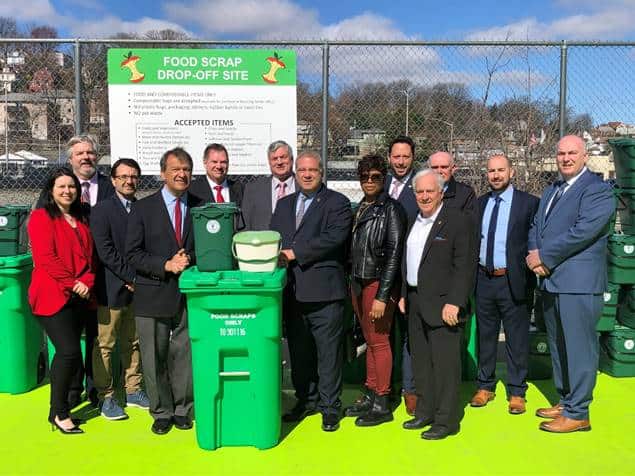
On April 8, Yonkers Mayor Mike Spano announced the expansion of the City’s recycling efforts with the launch of its new Yonkers Food Scrap Recycling Program. In partnership with Westchester County’s Residential Food Scrap Transportation and Disposal (RFSTAD) initiative, the new program allows Yonkers residents to collect and dispose of household food scraps for recycling. Starting today, the City of Yonkers is making food recycling kits available to residents so food scraps can be properly discarded and dropped off at the Yonkers Recycling Center to be composted later.
“Yonkers has increased its recycling rate by 44% over the last 10 years and with our participation in RFSTAD, our residents now have the opportunity to improve that number even more,” said Mayor Mike Spano. “Thanks to our partnership with the County, Yonkers can continue to do its part in reducing our carbon footprint and be leaders in creating a cleaner, greener, more sustainable Yonkers.”
Under RFSTAD, the County’s Department of Environmental Facilities arranges for the consolidation, transportation, and processing of food scraps collected by municipalities. The County’s participation reduces the cost so that it is the same as– or less than — the transportation and disposal cost of garbage, making food scrap recycling feasible for municipalities that otherwise would not be able to offer this service. With the City’s participation, Yonkers becomes the largest municipality to join Westchester’s Residential Food Scrap Transportation and Disposal program.
Westchester County Executive George Latimer stated, “This program has far reaching benefits for our County, our local municipalities – but more importantly the environment. With Yonkers joining the County’s Residential Food Scrap Transportation & Disposal (RFSTAD) program, our largest City with our highest population is now helping Westchester lead the charge for a more sustainable future. Congratulations to the City, Mayor Spano and our Department of Environmental Facilities for their efforts.”
Yonkers Department of Public Works is making home food scrap bins available for purchase ($20) at the Yonkers Recycling Center (735 Saw Mill River Road). Kits include one 1.9 gallon countertop pail, one six-gallon home storage and transportation bin and a roll of 25 compostable bags. Filled bags can be dropped off at the Recycling Center and the County Department of Environmental Facilities (DEF) then will later compost the scraps.
“Yonkers DPW is committed to expanding the city’s recycling efforts by promoting the proper and effective disposal of waste so we can better protect our environment,” said Thomas Meier, Commissioner, Yonkers Department of Public Works. “We encourage our residents to pitch in and join the County and City’s commitment to a more sustainable Yonkers.”
Jason Baker, Director of Sustainability for the City of Yonkers and Chair of the Yonkers Green City Advisory Committee said, “Expanding our recycling program to include food scraps is an important measure that will enable all Yonkers household members, including our youth, to directly participate in further reducing waste and greenhouse gas emissions. Thank you to Mayor Spano and County Executive Latimer for continuing to lead our communities toward a greener, healthier future.”
Food scraps are one of the largest components of trash sent to landfills and incinerators. In a landfill, food scraps create methane, which is a potent greenhouse gas that traps CO2 and contributes to global warming. When sent to an incinerator, food scraps reduce the efficiency of the incinerator because they contain water and therefore do not burn well. Instead of wasting energy trying to burn food, or creating methane from landfilling it, composting food scraps produces a useful and valuable product that gives back to the nutrient life cycle resulting in cleaner soil, water and air.
Residents can visit the Yonkers Recycling Center, at 735 Saw Mill River Road, Mondays – Saturdays, 7:30am-4:15pm. For more information on Yonkers Food Scrap Recycling program, visit www.yonkersny.gov/foodscraps.





